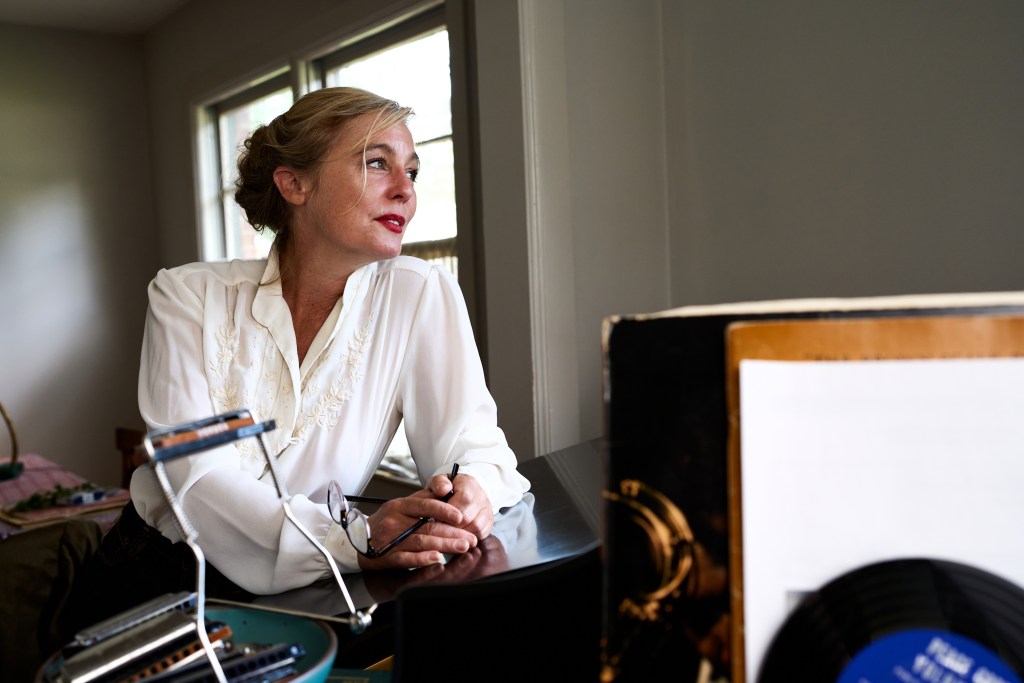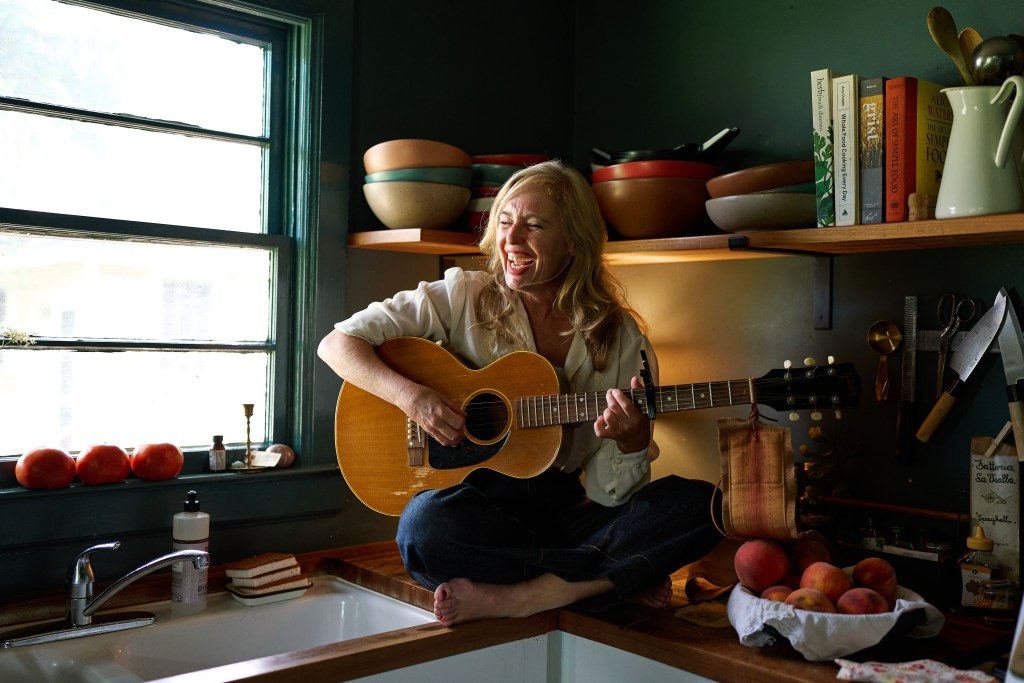A little over twenty years ago, Tift Merritt was 27 years old and on the road wrapping up tour for her debut album.
Bramble Rose hadn’t done crazy numbers, but critics were paying attention. Audiences were putting it on repeat. Merritt has a soulful charisma and classic country soprano that invites you to lean against a doorway and linger for another number. She got a call from Nashville with instructions: It’s time to write a hit.
“I was very aware that I was in a position to do something,” Merritt says, “but I was also aware that I was in a position where I had to work very hard.”
Although born in Houston, Texas, Merritt was raised in Raleigh and is a North Carolina girl through and through. She waitressed in Wilmington for a stint after high school before enrolling at UNC-Chapel Hill in the late ‘90s, where she immersed herself in the creative writing department, studying under Doris Betts and intending to become a fiction writer.
Restless, it wasn’t long before she was lured out of the classroom by Chapel Hill’s music scene—which has, after all, its own kind of storytelling. She began a formative relationship with Zeke Hutchins, a fellow musician and American Studies major, and started playing with local band Two Dollar Pistols. She wrote Bramble Rose, and her star ticked up as she toured the country and made the festival rounds.
After the tour ended, Merritt returned to her home outside Chapel Hill and settled in at the kitchen table, her dog Lucy by her side, to try and write some hits, as instructed. That’s where songs from her second album, Tambourine, originated—classics like “Laid a Highway,” “Good Hearted Man,” as well as a few others that didn’t make it past the cutting room floor and will be new to fans: “Broad Daylight,” “4th Street Windowsill,” and “Avalon Pier.”
This month, Merritt is gearing up for a special two-part release—a 20th-anniversary reissue of Tambourine, working with the album’s original producer, George Drakoulias, and Time and Patience, a compilation of acoustic demos and unreleased songs from those kitchen-table days. Both albums are due out on August 29 via One Riot Records. As someone who prefers looking to the future, she was initially hesitant to dial the clock back, she says, but agreed to rummage through the archives.
Once she began, she found a version of herself—and her material—that she loved and recognized.
At the time of Tambourine’s making, Merritt’s relationship with the music was more complicated. Being in a position to “do something” comes with pressure: look a certain way, sound a certain way. Americana music was still fringe in the early 2000s. Its roots—steeped in blues, rock, country, and folk—run deep, but as a genre it wasn’t what you’d call commercial.
“The good news was that people in the music business had ambition for me,” Merritt wrote recently on her Substack, Nightcap with Tift Merritt, reflecting on this era. “The bad news was people in the music business had ambition for me.”
Power pop ballads were commercial—see: Michelle Branch and Norah Jones. Country was commercial: LeAnn and Lee Ann topped the charts. And then there was Sheryl Crow, whose sunny, crunchy country sound Merritt’s label probably had in mind for her.
“My intentions, really, were intact the whole time. No matter what I went through and what bruises I got.”
These distinctions might seem negligible until you go back and read old coverage of her work, much of which seemed painfully preoccupied with pinning down a genre and attributing anything that fell outside such imposed categories as a misstep.
Merritt was still working on her image, wrote one reviewer, as another questioned whether her tough leather jacket really matched her sweet sound. What we’d now call roots rock was, to many in the business then, an identity crisis: too country for rock; too rock for country.
Tambourine went on to garner a Grammy nomination (something Merritt was told was a “fluke”) and become a modest classic in its own right, but the numbers still weren’t there, and she was “surrounded by people who I’m not sure knew who or what I was.” In 2006, her label, Lost Highway, dropped her.
“I sent them things like ‘Good Hearted Man’ and ‘Stray Paper’ and they were like ‘not a hit, not a hit,’” Merritt says of the songs she sent her label. “I was never good enough. The whole thing was very confusing. And then I got dropped, and I took it on as sort of true, somehow.”
Looking back on the great hope and heartbreak of this era for Time and Patience was a bittersweet task. In the end, though: Mostly sweet.
“It was a quiet personal victory to have someone want to celebrate my work and then to look back and find these things,” Merritt says. “And my intentions, really, were intact the whole time. No matter what I went through and what bruises I got.”

Twenty years later, and it’s a rainy Monday afternoon at Tift Merritt’s home in Raleigh. It’s a space filled with ephemera from her travels—ribbons, old photos, a collection of birds’ nests—lending it the moody feel of a shadowbox. Both her office and kitchen are painted deep blue shades that are hard to pinpoint—something like the outer bands of an agate slab.
I am fumbling trying to tell Tift Merritt that I like her name.
“It’s like ‘tuft,’” I suggest.
She laughs warmly, and then grows serious: “No, it’s not like that.”
This feels like a decent snapshot of Tift Merritt: deadpan, good-natured, and in tune with who she is; able to crack a joke and assert herself in the same breath. A rose and its bramble. Rock and country. Heart over hits. Tift, not tuft.
In the years since Tambourine, she’s carved her own path, securing a new label and releasing music at a steady clip: Another Country (2008), See You On the Moon (2010), Traveling Alone (2012), Night (2013), and Traveling Companion (2013, an extended version of the 2012 release). She collaborated with Andrew Bird, Sam Beam of Iron & Wine, and Mike Taylor of Hiss Golden Messenger. Most recently, she wrapped up a tour with The Mountain Goats.
She wrote some more big songs, like the quietly powerful “Another Country” and “Mixtape,” with its glancing, brassy pop. The haunting “Eastern Light,” with Sam Beam, feels like a song that might escape its musical form and follow the listener as a visual apparition. “Feeling of Beauty” follows the beautiful fault lines of Merritt’s voice, lingering on the husky asides and places where her voice searches and cracks.
She wrote songs about dive bars and payphone calls and traveling alone. She and Hutchins married and later divorced. She moved to Paris, then New York City. A few years later, she moved back to Raleigh, became a mother, and recorded her most recent album, 2016’s Stitch of the World.
What has she been doing in the years since then?
From the kitchen table, a few items offer clues: a thick paint swatch, a smattering of Post-it notes on the wall, scribbled with ideas. Merritt’s collaborations extend beyond music (“the interdisciplinary places in life,” she says, “are where all the good stuff lives”); for years, one such place was The Spark, a livestreamed artist interview series that began at Marfa Public Radio and eventually found a home with Carolina Performing Arts at UNC-Chapel Hill. At UNC, she put the bow on her undergraduate studies, infant daughter in tow, finishing a few outstanding credits (including “astronomy with a lab … it was so hard.”)

Eight miles down the road from UNC, Merritt is now a practitioner-in-residence at Duke University, where she works with the archives of Rosetta Reitz, a feminist jazz historian who ran a record label during the 1970s and ‘80s. Reitz’s history and the stories she collected are, Merritt says, a “story on repeat about how if women aren’t telling their own stories, the stories aren’t getting told.”
That urge to protect agency is reflected in Merritt’s public policy work, also at Duke, with music licensing—which is more intertwined with archival work than it might seem: It’s important, she says, to think about musicians like the one on Rosetta Records, “who are having digital afterlives and are being used to train AI without any compensation. This is a new business model where you train on humans and then replace them to expand your profits.”
“The interdisciplinary places in life are where all the good stuff lives.”
Merritt has long been an advocate for creatives, serving on the board of the Artist Rights Alliance, but since moving home, she’s further localized her efforts and turned them outward. She’s been involved with a succession of benefit concerts, one of which, Sing Out, feels particularly exemplary of her community ethos. The 2022 project drew together a range of local musicians, from Rissi Palmer to Kate Rhudy to Alice Gerrard, for a massive reproductive rights fundraising concert structured as an old-fashioned singing circle.
There’s at least one specific reason for the fervor of Merritt’s community involvement: Jean, her daughter, who is now nine. Having Jean meant that she wasn’t traveling alone anymore, Merritt says, and activated a desire to put down roots.
“I started considering what it meant to me to number one, be a parent, and number two, to be a somewhat public figure in North Carolina,” she says of her activism; a conversation “that I have to have with myself about how to have a positive impact on the world—for my kid and everybody else’s kid, right? I’m not going to be here forever, and I want this world to be as good as it can be.”
The road for an artist after the initial industry shine wears off is uncertain. You can go electric, disappear, acquire a trust fund romance, maybe become an influencer. Or: You can embrace the immediate incongruencies, pour yourself into other people’s stories, and let time and patience work their magic on your own story. On both Time and Patience and the remastered Tambourine, the keen, glinting integrity of Merritt’s voice and songwriting shine clearly through. Maybe, with this reissue, a new generation will come to love these songs as others have.
If they do, they’ll have a place to match the music: Merritt’s biggest outstanding project is a renovation of the Gables Motor Lodge, a historic space she purchased several years ago alongside The Durham hotel’s Daniel Robinson. Located in Raleigh’s Mordecai neighborhood on what was once a humming U.S. Highway 1 route, the New Tudor-style lodge is charmingly unassuming, with its modest awnings and weathered neon sign, but you get the feeling that its 18 rooms have seen a lot of lore.
The renovation has been several years in the making—that’s what the paint swatch is for—and the plan is to open next summer as a lodge, artist’s retreat, and neighborhood bar. After years on the road, Merritt knows the value of a soft landing spot.
“We hope that it will feel good to travelers and people returning home to their neighborhood alike,” says Merritt, “that it’ll be very well traveled—like a leather jacket that only feels better with use.”
Does she have such a leather jacket?
She laughs: “Oh, yes.”
Follow Culture Editor Sarah Edwards on Bluesky or email [email protected].
